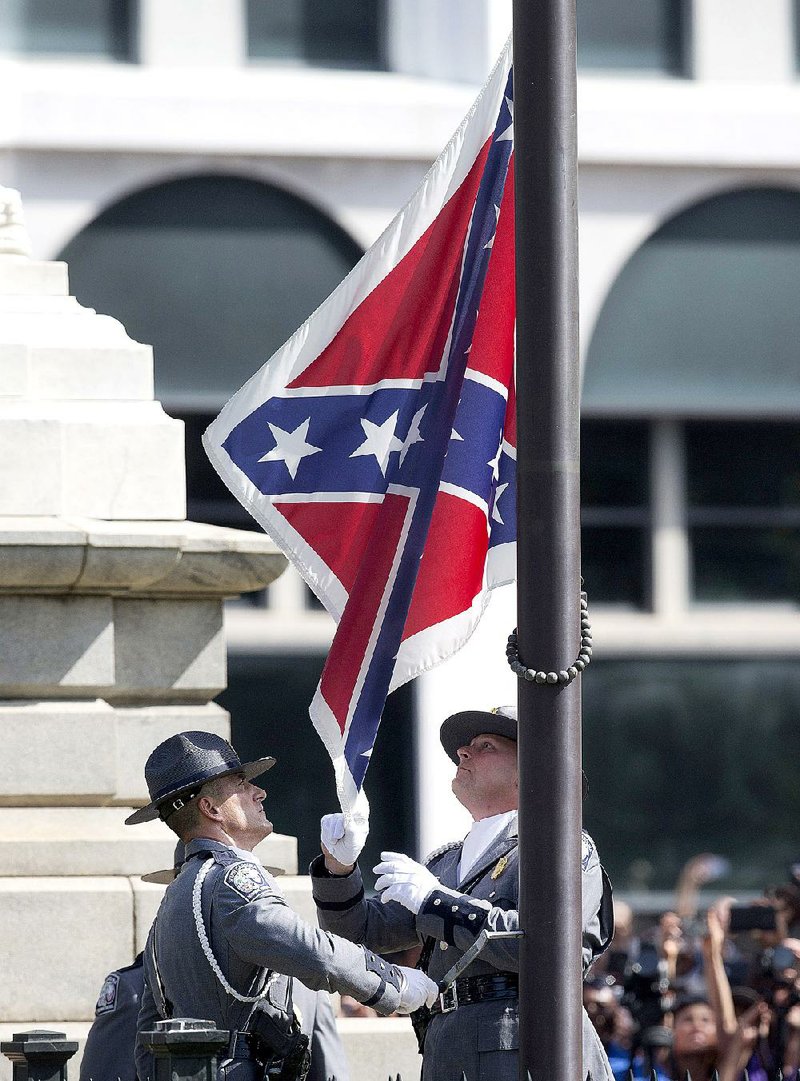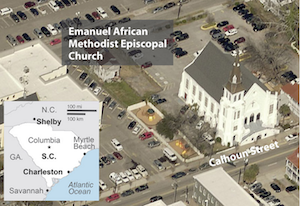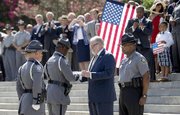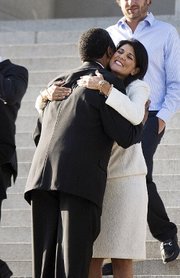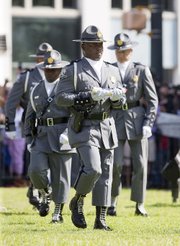COLUMBIA, S.C. -- The Confederate flag on South Carolina's Statehouse grounds was removed during a Friday morning ceremony, ending its 54-year presence at the Capitol.
Members from a South Carolina Highway Patrol honor guard approached the Confederate memorial, and as one turned a lever to lower the flag, a large crowd burst into sustained applause and chanted "U.S.A.!" The flag will be placed in a museum.
Cheers and hugs punctuated the morning. Just before the ceremony, a few gray-haired white men at the front of the crowd waved Confederate flags. Many more, both black and white, waved the U.S. flag.
Cleo Bethune, 70, looked at the slightly faded Confederate flag before the troopers removed it.
"I feel very emotional," said Bethune, who is black. "Everyone who embraces it should enjoy this moment and move on. Just move on."
Friday's ceremony in Columbia followed weeks of debate in South Carolina over the flag's place on the Statehouse grounds after last month's mass shooting of nine worshipers at a historic black church in Charleston.
After the massacre, the state and U.S. flags atop South Carolina's Capitol dome were lowered. But the Confederate battle emblem on the Statehouse grounds flew high; only the Legislature had the power to lower or bring it down.
Photos then emerged of the shooting suspect, an avowed white supremacist, posing with the Confederate symbol. The flag's place in the state gained instant national scrutiny, with those calling for its removal saying it symbolizes racial hate and violence.
An activist climbed atop the flagpole and removed the flag; she was arrested and the flag was replaced.
Several officials also said the flag should be taken down, including Republican Gov. Nikki Haley, who asked the Legislature to take up the issue. Lawmakers passed a bill this week to remove the flag.
"In South Carolina, we honor tradition, we honor history, we honor heritage, but there's a place for that flag, and that flag needs to be in a museum, where we will continue to make sure people will honor it appropriately," Haley said Friday morning on NBC's Today show. "But the Statehouse, that's an area that belongs to everyone. And no one should drive by the Statehouse and feel pain. No one should drive by the Statehouse and feel like they don't belong."
In a Twitter post Friday, Haley wrote, "It's a new day in South Carolina," with a photo of the scene outside the Statehouse.
President Barack Obama posted, "South Carolina taking down the confederate flag -- a signal of good will and healing, and a meaningful step towards a better future."
The Confederate flag flew on top of the state Capitol's dome starting in 1961. A compromise lawmakers reached in 2000 relocated it to a Confederate war memorial on the Statehouse grounds.
South Carolina's Senate swiftly and overwhelmingly approved a bill this week to lower the flag and place it in the nearby Confederate Relic Room and Military Museum.
That bill passed the House with bipartisan support early Thursday after 13 hours of increasingly tense and emotional debate, in which defenders of the battle emblem insisted it represents Southern heritage, not racial oppression as argued by those who wanted to bring it down.
Haley signed the measure into law Thursday, using nine pens in the ceremony. Each pen will go to the family of one of those killed in the shooting at Emanuel African Methodist Episcopal Church last month.
But contention over the battle flag remains far from settled.
The leader of the South Carolina chapter of the Sons of Confederate Veterans refused to attend Friday's ceremony, instead recalling his seven ancestors who fought for the South in the Civil War.
"I'm not going down there to watch them be dishonored and defamed," Leland Summers said.
Symbols scrutinized
The debate over Confederate symbols has ricocheted beyond South Carolina.
Lawmakers in other states are targeting other Civil War-era symbols. The Mississippi flag includes the rebel battle flag, and Georgia's incorporates another Confederate design. Thousands of Southerners drive cars with license plates featuring the rebel banner, which was quickly banished from Alabama's Capitol and federal cemeteries since the shootings.
In Memphis, officials are working to remove the remains and a statue of slave trader, Confederate general and Ku Klux Klan founder Nathan Bedford Forrest from a prominent city park.
In the Dallas area, a statue of Robert E. Lee was spray-painted with the word "shame" overnight Thursday in Lee Park, where two weeks ago a small group of protesters gathered to hold an "un-dedication."
Members of the U.S. Congress also have taken up the issue within the halls of the U.S. Capitol, where House Speaker John Boehner, R-Ohio, called for a review of Confederate symbols.
On Friday, House Republican shelved plans to move forward on routine spending legislation, amid concerns that Democrats could hijack the bills to debate the flag.
House Republican aides said a bill covering general government operations tentatively set for consideration next week would not be considered after all.
That followed an incident Thursday in which Republicans had to shelve a different bill when some Southern conservatives opposed a last-minute amendment to block display of the Confederate flag at federal cemeteries.
After the South Carolina ceremony, Boehner issued a congratulatory statement to state officials for removing the flag. And in an interview taped Friday for airing Sunday on CBS' Face the Nation, he said "the flag should be gone" from national cemeteries.
Boehner also announced plans for bipartisan talks to resolve the matter.
On Friday, House Majority Leader Kevin McCarthy, R-Calif., was spotted exiting a private meeting with civil-rights leader Rep. John Lewis, D-Ga., though neither man would comment. Lewis has pushed for removing the many Confederate statues and symbols from the Capitol.
In South Carolina, Friday's ceremony took place near a statue of Benjamin Tillman, a South Carolina governor who went to Washington as a U.S. senator and proudly described how he undermined post-Civil War Reconstruction by killing black people who tried to vote in the 1800s.
The South Carolina NAACP said Friday that is is not calling for the removal of such monuments, but it does want them to tell larger truths.
For example, state NAACP President Lonnie Randolph said, the Tillman statue should also note that he was responsible for a mob that killed six blacks in 1876 and put their bodies on display as a warning against trying to vote.
"South Carolina has an unfortunate distinction of breeding bad people. I'm not going to criticize any of them, but you know who they are. All you have to do is go outside and look at the monuments," Randolph said.
Flagpole yanked, too
On Friday, crowds streamed toward the state Capitol, many dressed in shorts and hats and some in their Sunday best.
Among them was Yvonne Pygatt, a retired social worker whose cousin Myra Thompson was killed in the church shooting.
"This is a proud moment, but this is something that should have happened a long time ago," said Pygatt, 60, standing in the hot sun at the Statehouse where she had been involved in many rallies over the years to bring the flag down.
"For those nine people and their families, if they didn't take it down they'd have to see that flag flying here, and it'd bring back all those memories," said her friend Annie McDaniel, a school district official who had also rallied to remove the flag. "Honestly, I thought it would never happen."
Some members of the crowd continued discussing the flag's meaning moments before its removal.
Dwayne Gross, who owns an information technology company, drove from Charlotte, N.C. Seeing the few white men waving Confederate flags and talking about heritage, Gross, who is black, said: "Their history is not that important to me. If they had their way, I'd still be a slave."
Gross said his own feelings about the flag's removal were "mixed." He added: "What's it really going to change in terms of peoples' lives?"
Nearby, James Wilson, who is white, agreed, and stood with his camera pointed at the flagpole.
"I grew up around a lot of racism and flag-waving, and it's been misused so much over the years," said Wilson, 64, a mental health counselor from Columbia. "I think this changes the mood. It's going to create a dialogue."
As the flag began to descend the pole, and the clapping and cheering rose, Bethune's cousin Lionel Johnson, 65, shouted, "There it comes down! Yeah! All right! Yes! Yes!"
Johnson's 19-year-old grandson Rayneth Johnson held up his cellphone, and the flag disappeared from view.
When it was done, Cyrus Thornton, a 31-year-old pastor at Calvary Baptist Church in Columbia, asked someone to snap his photo in front of the empty pole. Later Friday, the 30-foot pole was yanked out of the ground after several tugs from a crane.
"I feel good," said Thornton, who is black. "I finally feel like I'm part of this great state of South Carolina."
Information for this article was contributed by Stephanie McCrummen and Elahe Izadi of The Washington Post; by Jeffrey Collins, Meg Kinnard, Erica Werner and Andrew Taylor of The Associated Press; and by Robert Wilonsky of The Dallas Morning News.
A Section on 07/11/2015
